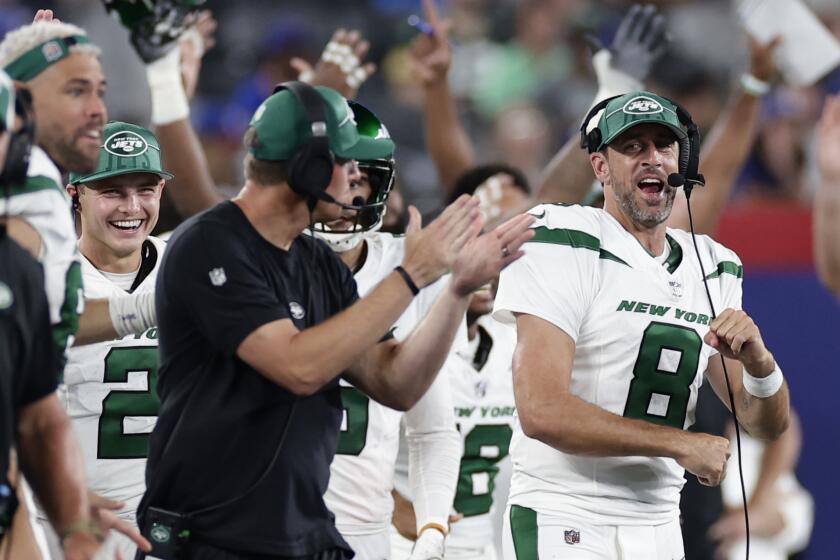How a negotiation over cable fees could weigh on Paramount’s sale

- Share via
Paramount Global’s sale talks with David Ellison’s Skydance Media face a milestone later this week, but the battered Redstone family-controlled media company has been scrambling to meet another deadline — one that also carries huge implications.
On Tuesday, Paramount and Charter Communications agreed to a deadline extension as the two sides worked to hammer out a new distribution agreement for Paramount’s channels, which would replace a three-year pact that was due to expire this week, according to knowledgeable people who are not authorized to comment publicly on the high-stakes talks.
Charter pays Paramount significant fees to carry its channels, including CBS, BET, Comedy Central and Nickelodeon, on Charter’s Spectrum television service. As Paramount‘s cable networks lose viewers and advertising revenue declines, the company must protect the affiliate fees it receives from distributors, including Charter. Paramount cannot afford to lose such a key source of revenue from one of its primary partners.
The outcome of the negotiations could weigh on Paramount’s valuation in the event of a sale.
While the length of the contract extension is not clear, it does give Paramount some breathing room in what has become a chaotic and difficult period.
Paramount’s Chief Executive Bob Bakish was bounced on Monday, amid increasing tensions with controlling shareholder Shari Redstone, who is pushing to sell her stake in her family’s media empire.
He was replaced by three senior entertainment executives who now make up an “office of the CEO.” The company also reported earnings that beat estimates, but executives refused to take questions during their customary conference call with Wall Street analysts.
The company’s stock is down 50% in the past year. Paramount fell 7.2% Tuesday to $11.37 a share.
Skydance Media CEO David Ellison, son of billionaire Larry Ellison, has emerged as a strong contender to take over the iconic Paramount studios.
Nonvoting B-class shareholders have fumed over the terms of the Skydance deal, concluding that it would bestow Redstone with a rich premium at the expense of other shareholders. Meanwhile, independent directors are weighing the Ellison group’s sweetened offer, which has been described as its “best and final.”
Paramount’s board will soon lose five directors, including Bakish.
Even before the boardroom and management turmoil, Paramount was seen as having a weak hand in its negotiations with Charter, which currently offers 25 Paramount-owned television channels to its 13.7 million Spectrum TV subscribers.
“The majority of Paramount’s current U.S. cable networks are at risk,” Bank of America media analyst Jessica Reif Ehrlich wrote in a research note for investors this week, adding that a bad result in the Charter talks could threaten Paramount’s financial foundation and potentially “impact the company’s ability to execute a sale under favorable terms.”
The reason: Paramount’s “TV media segment still generates an overwhelming percentage of the company’s earnings and cash flows,” Reif Ehrlich wrote. Investors and potential buyers have been watching the Charter talks closely as they consider how much Paramount is really worth.
Apollo Global Management has offered $26 billion, including the absorption of Paramount’s nearly $14 billion in debt, which some shareholders favor over the two-phase deal orchestrated by Ellison’s Skydance along with investment firms RedBird Capital Partners and KKR. Paramount had granted the Ellison group 30 days of exclusive negotiations. That period ends Friday, however, sources close to the sales process say they expect the talks to continue past this week.
Paramount and Charter representatives declined to comment.
Paramount CEO Bob Bakish’s ouster comes a day after David Ellison’s Skydance Media sweetened its offer for Shari Redstone’s National Amusements, with money earmarked for Paramount’s Class B shareholders.
Paramount Global, long known as Viacom, has struggled to adapt in the streaming era.
Broadcast network CBS has largely maintained its popularity — its February broadcast of the Super Bowl drew a record 123.4 million viewers — but the viewership shift has pummeled Paramount’s cable channels, including MTV, VH1 and Nickelodeon, putting the company in a tough spot.
At the same time, cable companies are losing pay TV customers at a rapid clip and don’t want to give subscribers another reason to flee by asking them to pay more for programming that they don’t necessarily watch.
Stamford, Conn.-based Charter has increasingly balked at paying high fees for cable channels that have been hemorrhaging viewers in recent years as consumers shift to streaming and other video-on-demand options.
Charter also has demanded concessions on carriage terms for streaming services, such as Disney+ or Paramount+, which compete with its Spectrum channel bundles.

Last summer, Charter drew a hard line during its negotiations with Walt Disney Co., which led to a 10-day blackout of Disney-owned channels, including its ABC and ESPN networks. Charter threatened to permanently pull all the Disney channels from its Spectrum TV service unless Disney caved to some of its demands — a scenario that would have been unthinkable a decade ago.
In the end, Disney sacrificed carriage on Spectrum for several smaller channels, including Freeform.
Losing networks could be particularly painful for Paramount.
More than a decade ago, Paramount programmed nearly three dozen cable channels and collected handsome fees for the distribution rights. However, over the years, distributors including Dish Network and Charter have refused to continue to carry what they view as nonessential ones — and that wrangling was expected to be a key hurdle in the Charter talks.
For example, Charter offers its customers five MTV channels: the main network MTV and spinoffs MTV2, MTV Classic, MTV Live and MTVU. MTV‘s programming lineup relies heavily on “Awesomeness,” a twist on talent competitions. There are four Nickelodeon channels, the flagship kids network as well as Nick Jr., Nick Music and Nick Toons.
The blackout ended Monday with a new distribution deal, hours before the New York Jets-Buffalo Bills ‘Monday Night Football’ game on ESPN.
Charter is expected to push for the ability to drop channels with meager ratings.
“In our view, the critical carriage would be for Nickelodeon, MTV, BET, Comedy Central and Paramount Network,” Reif Ehrlich wrote.
One sticking point for distributors, including Charter, is that Paramount makes much of its content available to subscribers of Paramount+, the streaming service the company offers for $5.99 to $11.99 a month. That, in some cases, is less than what cable distributors pay for the same content.
The television programmers’ move to offer their own streaming services has rankled distributors, who feel that their longtime partners have turned into rivals. Charter Chief Executive Christopher Winfrey has said his company would take a tougher stance in its carriage negotiations.
“Our goals here are really to re-create a video ecosystem that works for everybody. Today, it doesn’t,” Winfrey said last week on the company’s earnings call. “It’s been broken, and it’s been broken for a while.”
More to Read
Inside the business of entertainment
The Wide Shot brings you news, analysis and insights on everything from streaming wars to production — and what it all means for the future.
You may occasionally receive promotional content from the Los Angeles Times.














